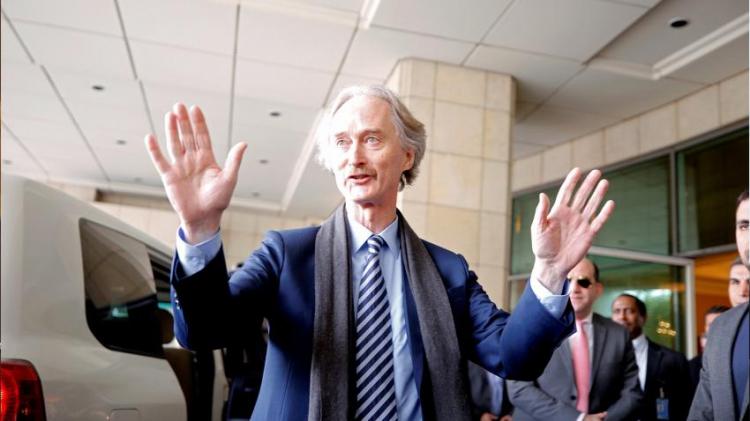Constitutional Commission, absence of parties and delay in the solution
The mechanisms of the new constitutional commission are still debated and discussed by the concerned parties with the Syrian issue, despite the announcement of an agreement on the six controversial names, which came after repel and replies among the opposition, the Syrian government, Russia, Turkey and the United Nations, so the months-long node has begun to dissolve.
Syrian government media outlets confirmed the arrival of the Russian special envoy to Syria Alexander Lavrentiev on a visit to Damascus, during which he met the Syrian President Bashar al-Assad, where they discussed issues related to the constitutional committee.
The visit came after remarks described as “optimistic” by the Russian Foreign Minister Sergei Lavrov and his deputy Mikhail Bogdanov, about the imminent launch of the constitutional committee before the end of September.
The process of resolving the complexities of the constitutional commission also coincides with today’s meeting in Ankara, between the leaders of the guarantor countries of the course of Astana Agreement, Vladimir Putin, Hassan Rouhani and Recep Erdogan.
While the representatives of the Syrian Democratic Council (SDC) were absent from participation, despite the full support of the Global Coalition and the United States, which some saw as a deliberate absence of a key component of the Syrian society and the political process.
Grit cook
Syrian researcher and academic Muheeb Salha told North-Press that, “the godfathers of the committee don’t shy away from the marketing of flimsy pretexts which justify wasting time in its formation”, he believes that these “superficial” differences try to “obscure the main ones”.
He outlined these fundamental differences by saying that, they were related to the works of the constitutional commission and its authorities, and the basis for the amendment process whether it was a new constitution or an amendment to the 2012 constitution and its decision-making mechanism.
“The disagreements may reflect the political incompatibility among the intervening and active countries in the Syrian issue about the form and substance of its solution”, Salha said.
He stressed that, “the national dialogue on the basis of equality and parity of opportunities”, is the only means that, according to the academic researcher “can produce national solutions embodied in a permanent constitution prepared by Syrians in accordance with established legal norms and known international standards”.
He pointed out that, the solution must be as mentioned above “and not just an international grit cook intended to break the teeth of Syrians and their delusions of satiation”.
Salha stated: “Putting the cart before the horse is responsible for the delay in the formation of the constitutional committee”, saying that the latter is intended to “buy time by the parties of Astana and Sochi”.
He devoted the last point to the consensus between the Russian Federation and the United States, which he considers “the password for any solution for the Syrian issue”, including the constitutional process of constitution, elections and constitutional institutions.
Rationalization of demands
While the secretary of Sochi conference and spokesperson for the Internal Oppositional Front Mays Kreidi told North-Press: “The gate of dialogue should be from the gate of the Syrian government, but with the rationality of demands and in the presentation and understanding of the political reality and geopolitics”.
Kreidi also believes that there is investment by some countries in the file of disputes among the Syrian parties, hoping that there will be no dark end, and that a serious dialogue in this direction should be reached.
She insists that the problem is “the progress of global negotiations on a new reality going through Syria”. Kreidi finds it difficult to find a relationship with the Syrian government, which results “dissatisfaction and conflicts that may lead to areas of punishment, starting with the ban on travel and ending with arrest”, according to her.
A constitution is contingent upon participation
While Aldar Khalil, the member of the executive committee of the Movement for Democratic Society in northern Syria, said that if “the decision regarding the solution in Syria is available, then all parties will be required to participate in the constitutional committee”.
“We need to participate everyone, especially since we manage more than 30% of the Syrian territories, so it is inconceivable to stay out of the understandings on the commission if it happens, so we see the impact of the Turkish lobby on other parties”, Khalil told North Press.
Khalil stressed that “the success of the revolution is contingent on the internal agreement of the Syrians themselves, saying that any solution coming from abroad won’t represent the truth of the solution to the Syrian issue, because the best solution is the consensus of the Syrians”.
He added that the Syrian Democratic Council (SDC) “has been seeking for some time to bring the views of the Syrians closer, but there are things that delay the Syrian-Syrian agreement, such as the Turkish intervention, which seeks to create a rift among the Syrian democratic forces”.
In the absence of participation by all parties, the constitution – according to Aldar Khalil: “Won’t be representative of all components of the Syrian people, and thus the project of the new Syrian constitution won’t succeed”.

